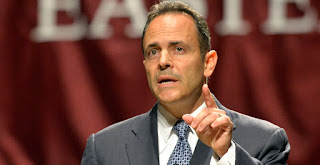This from the
Richmond Register:
Eastern Kentucky University's Board of Regents approved an
increase in the in-state tuition rates for the 2016-2017 school year
Wednesday.
Tuition will be increased by five percent,
which equates to an extra $209 a semester, or $418 yearly, for all
in-state residents.
The rate increase is slightly
below the tuition cap of 5.3 percent that was set Tuesday by Kentucky's
Council on Postsecondary Education for 2016-17.
The board also approved to increasing 2016-2017
residence hall rates by 3.8 to 5.4 percent. EKU Student Government
Association President Katie Scott was the only vote against the
increase.
Barry Poynter, vice president for finance
and administration, said the rate of residence hall increases is based
upon the hall's conditions and amenities.
Tuition for Model Laboratory School will remain the same as approved by the regents.
During
his report to the board, President Michael Benson recommended that
several cost-avoidance actions take place in order for the university to
remain financially stable.
Most of the actions, which
were recommended by a number of departments and committees, affect
employees of the university directly.
The board
approved proposals to: reduce the tuition waiver benefit for current
full-time employees from twelve, to nine credit hours; revise the
university's cell phone policy which, according to Benson, costs the
university nearly $300,000 a year; increase benefit eligibility for
part-time employees who work 30 hours up from 24, which will reportedly
save the university $115,000; allow full-time staff to only accrue one
year of vacation time instead of two years.
The
president said while the university's benefits package is a great
recruiting tool for potential employees, these changes would put EKU in
line with other institutions.
Benson also
recommended, and the board approved the creation of a faculty efficiency
task force which will work with faculty members on ways they can rely
less on adjuncts and contractual employees.
As the
budget discussions move forward, the university president asked the
board to consider creating a university-wide budget review committee.
"We
all know, going into this process, time is not our friend," Benson told
the regents. "Going forward, we need to look for ways to become more
efficient."
The president proposed the group consist of
both members from the academic side and staff sides of the university,
and that they bring forth ideas about how to handle budget concerns to
the board's June meeting.
Benson also recommended
looking into modifying some aspects of the university's healthcare plan
while also reviewing the university's contractual services for the
state, which returns little, if any, revenue.
According to the president, the measures would save the university roughly $1.5 million.
The
board unanimously approved a contract extension for Benson during
Wednesday's meeting, which would add an additional two years on the
president's current obligation.
Chairman Craig Turner
said Benson's extension comes with no increase in salary and has the
same conditions for termination as the president's original contract.
After the board's approval, Benson was treated to a round of applause.
Regent Janet Craig praised the president for his efforts to address the university's budget issues.
'We
as a board, appreciate the job the president is doing. If financial
circumstances were better, I would vote for a raise. We know he is the
right one to lead us through these times," Craig said during the
meeting.
Turner also complimented Benson's work saying
the president was "extremely innovative and responsive" to the changing
needs of the university.
Turner also enlightened the board on the decision of
university presidents to agree to Governor Matt Bevin's immediate 4.5
percent cuts and the challenges that await.
"Unfortunately,
we are on a very short time frame with some of the challenges, because
of mixed messages from congress," Turner said Wednesday afternoon.
The
Board of Regents chair said while Benson and other university
president's "fought a really good fight," the surprise budget cut of 4.5
percent to the current year and the agreement of the governor to reduce
the cuts to two percent drove the president's to agree.
"Under the current situation we feel it was the right thing to do," Turner said.
Benson later admitted to the board he felt as if he and the other president's backs were against the wall at the time.
However,
Turner warned the board the future performance-based funding criteria
will be another challenge the university will face.
According
to Turner, the performance-based funding guidelines are more like
additional cuts to the university as all post-secondary schools will be
put together in a pool with specific metrics that will lead to a "winner
takes all" scenario. Under Bevin's proposed plan, one-third of state
funding for universities in the 2017-18 fiscal year would be based on
this model. Turner said he is confident EKU will be able to remain at
the top of the list of high-performing schools, but warned that changes
would have to be made and that details have yet to be defined in the
proposed model.
"The real danger in the future is
performance-based cuts," Turner explained. "However, students are going
to remain our primary focus. We are not going to compromise our academic
standards and our faculty and staff are our greatest assets."
The chair said Wednesday's discussion, while not a light-hearted topic, was one of progress.
"As
we look at the budget, there may be short-term pain for long-term
success. Today we have had unbelievably healthy conversation about what
is important to Eastern."













